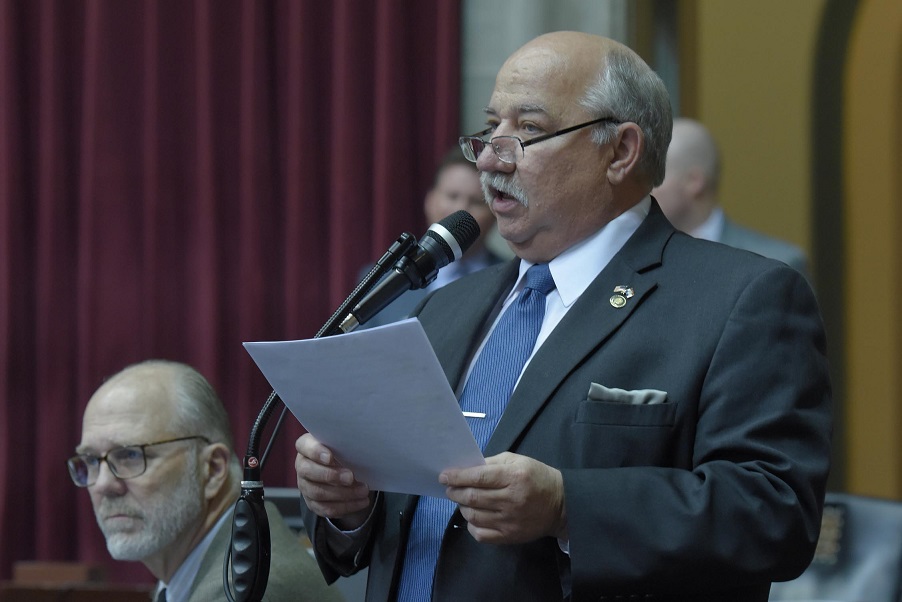A House committee has heard from dozens of Missourians that it could help secure relief for families that have suffered for decades due to radioactive contamination throughout the St. Louis region.

Nuclear weapons development and testing there in the 1940s and ‘50s contributed to the U.S. having the atomic bombs used in World War II. That work, also known as “The Manhattan Project,” also eventually led to the dumping of nuclear waste near Lambert airport which contaminated soil, Coldwater Creek, and the Creek’s floodplain.
Residents who live or have lived, or whose families have lived, in the affected region, testified for more than four hours Tuesday night about House Concurrent Resolutions 21 and 22, which would trigger an investigation by state agencies into whether those residents could be eligible for federal relief funds in programs that already exist to compensate those harmed by nuclear testing.
The Committee on General Laws heard story after story of cancer clusters; high concentrations of extremely rare diagnoses; and of mental, physical, and financial suffering that has impacted multiple generations.
The sponsor of HCR 21 is Tricia Byrnes (R-Wentzville), whose son was diagnosed at age 15 with thymoma, a form of cancer typically caused by the use of radiation or chemotherapy to treat a different cancer. Some experts have told her that his may be the only case in history of thymoma being a patient’s primary diagnosis.
It was his diagnosis that led to her investigating the issue of contamination in the St. Louis region, and eventually to filing HCR 21.
Representative Richard West (R-Wentzville), who sponsors HCR 22, said he began learning about the situation after his mother was diagnosed with multiple myeloma. He learned that one cause of that form of cancer is contaminated water, and he knew that among the sites tested for radioactive contamination were wells like those on his parents’ property.
“A year later I am knee-deep in one of the largest atrocities laid on the American people by their government. The issue spreads from the Mallinckrodt sites in St. Louis City out to Latty Avenue, the Berkeley, Bridgeton, and Hazelwood areas, Coldwater Creek through Bridgeton and the legacy landfills, and finally out into St. Charles County’s Weldon Springs site, owned by the Department of Energy,” said West. “While most of these sites are proclaimed as ‘cleaned up,’ we are constantly finding hot spots and families impacted by these areas and the dangers they hold.”
One of those who testified Tuesday was Christen Commuso, the Community Outreach Specialist with the Missouri Coalition for the Environment. Commuso also lived in St. Ann until the age of 7, and often played in Coldwater Creek. She is among those diagnosed with cancer at an early age, as well as other diagnoses. Among other procedures she has undergone, she has had her gallbladder and left adrenal gland removed, and had to have a total hysterectomy.
She told lawmakers that the emotional and physical tolls on her and her family have been massive, and the cost at times is so great that she is forced to skip appointments or tests.

“For each one of us here today there are probably 20 back home facing the same challenges or worse. That’s why I’m asking you to stand with us. Help ease some of the burden and fight for the medical monitoring and compensation this region deserves,” said Commuso. “Now is the time for the people and the state to work together. St. Louis stepped up to save the nation. Now it’s time the nation stepped up to save St. Louis.”
Karen Nickel grew up in Hazelwood and played in a park on the bank of Coldwater Creek, and the Creek flooded other local playgrounds and backed into her parents’ basement.
“We played in that park. We ate snow during snowball fights. We took the honeysuckle off the banks of the Creek and sucked the stuff out of them. We spent a lot of time there,” said Nickel. “I am sick. I have three autoimmune diseases. I have lupus, psoriatic arthritis, I have Sjogren’s disease,” said Nickel.
She and other residents explained that the impacts of this contamination go beyond any one individual. Some families spend decades trying to keep more than one of their members alive. The radiation can also cause mutations that put future generations at risk, even when there had been no history of such diseases in those families prior to the contamination.
Thomas Whelan taught for 30 years at Francis Howell High School, a school that was within walking distance of a uranium processing facility. He and several others said that as that site was cleaned up students were exposed to particulate matter and other contaminants.
“When that plant was imploded … I was there. We were watching the whole thing go down. It was like an implosion, and that dust, guess where it went? A thousand feet away into the playing fields of Francis Howell, into the duct work of Francis Howell, into the air system of Francis Howell,” said Whelan. “There’s kids still at that school right now and many of those kids are second and third generation Francis Howell students who might, and may not know this, have the altered DNA that they’re going to continue to pass on.”
“You’re taking the first step,” Whelan told legislators. “This is going to be one of the biggest environmental cover-ups in U.S. history and we are starting, right now, today, asking you to start that process.”
The committee has not voted on those resolutions.


